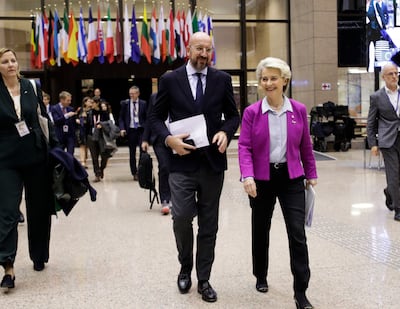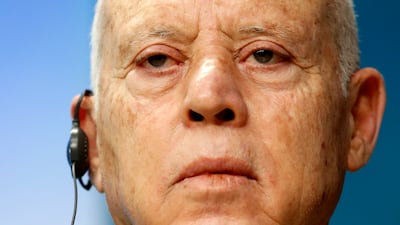Tunisian President Kais Saied can lay claim to causing more trouble for European leaders from Carthage than any figure since Hannibal crossed the Alps almost 2,500 years ago.
A controversial deal struck this summer between the European Union and Tunisia to address migration has caused simmering tensions to boil over between the bloc’s two most senior public figures: Charles Michel and Ursula von der Leyen.
As President of the EU Commission, the bloc’s executive arm, Ms von der Leyen is the more prominent face on the international stage and was the official who signed the agreement in July with Mr Saied at Carthage Palace in Tunis.
But Mr Michel presides over the powerful EU Council, where national leaders meet to decide on major decisions, and also travels the world speaking in the name of the union.
Their dispute undermines the EU’s ability to effectively implement the deal, which has been weakened by Mr Saied recently saying he is no longer interested.
Prominent European legislators such as Manfred Weber have ridiculed the situation, telling news website Politico: “If doubts are now being sown both on the European side with Charles Michel’s statements and on the Tunisian side, then it is of course extremely dangerous.”
Migration is a deeply controversial topic in the EU, which since 2020 has been negotiating a new migration and asylum deal and has recently turned to non-EU countries such as Tunisia to help stem arrivals, while remaining divided on how to handle migrants once they land on European soil.
In a recent interview with German news outlet Der Spiegel, Mr Michel said the council had been excluded from the commission’s agreement with Tunisia, in which it promised €1 billion ($1.05 billion) in aid and investment in exchange for Tunisian border guards stopping an increasing number of migrants making the dangerous trip to the EU.
“The EU is based on treaties and it would be wise to stick to them,” Mr Michel said.
In rare criticism of the EU Council, a representative for the EU Commission on Wednesday said Mr Michel's comment was “partially inaccurate and in no way strengthens the EU’s ability to act effectively in dealing with the difficult issue of migration“.
Tensions between the two European officials have often spilt into the public realm. In a famous incident known as “sofagate”, in 2021 during a trip to Turkey, Mr Michel sat in the only chair available near Turkey’s President Recep Tayyip Erdogan, forcing a visibly shocked Ms von der Leyen to sit on a sofa – a breach of protocol.

Meanwhile, there has been additional confusion around the implementation of the agreement, with contradictory statements coming out of Brussels and Tunis.
One week after Ms von der Leyen visited Lampedusa in a show of public support to Italian Prime Minister Giorgia Meloni as the number of migrant arrivals surged, the EU Commission on September 22 announced it would send a first tranche of €127 million ($133 million) to Tunisia.
But on Monday, Mr Saied said he rejected the EU’s financial support, describing it as mere charity. The announcement puzzled officials in Brussels, with one saying that Mr Saied had probably expected more than €127 million as a first disbursement of the €1 billion package.
Questioned on Wednesday, an EU Commission representative said Tunis had requested a disbursement of €60 million in budgetary support on August 31 and that Brussels had sent the money “earlier this week”.
Yet, on the same day, the Tunisian Ministry of Foreign Affairs responded that it had not agreed to this disbursement and referred to Mr Saied’s earlier statement.
Tunisia is free to wire the money back, said the EU's commissioner for neighbourhood and enlargement Oliver Varhelyi, who clarified the €60 million was not linked to the agreement.
"Tunisia is free to cancel its formal disbursement request & wire back the money to the EU budget," wrote Mr Varhelyi on X, formerly Twitter, on Thursday.
"Implementation of the MoU [memorandum of understanding] should continue once Tunisia returns to the spirit of our strategic & comprehensive partnership based on mutual respect."
Tunis also denied entry last month to a European Parliament delegation after several MEPs criticised the country’s human rights record and its treatment of sub-Saharan migrants.
The EU Commission had high hopes the agreement with Tunisia could be replicated with other countries in the region, such as Egypt.
The bickering on display so far seems to indicate that such hopes may have been premature.


